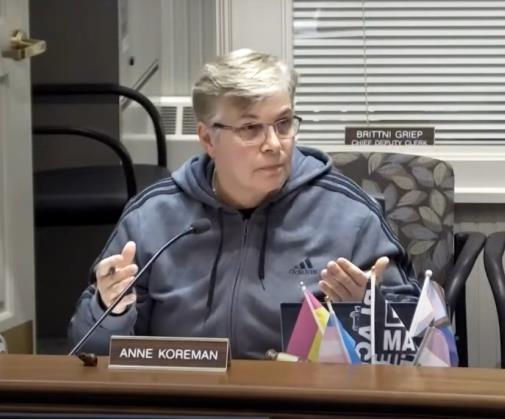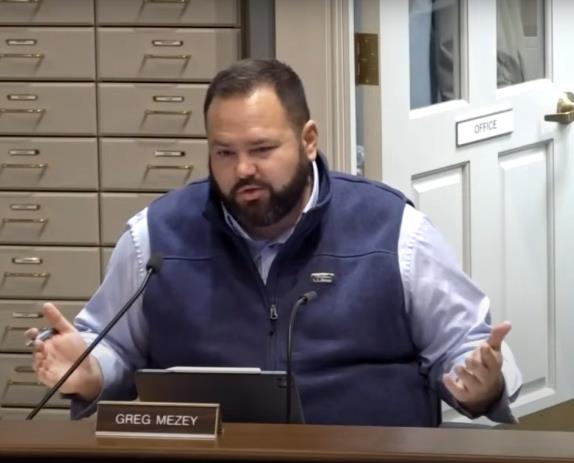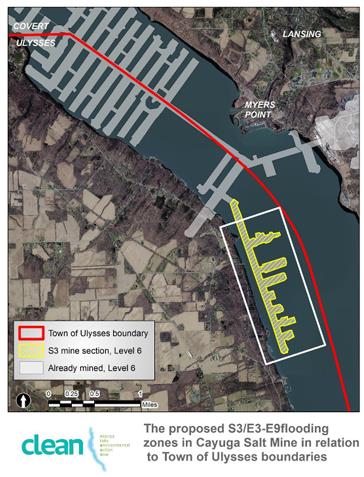Also: Town Board affirms Cargill-critical pleading

by Councilperson Robert Lynch; January 12, 2025
It’s jumped onto a bandwagon that had steered very much toward the ditch a few years ago but now finds itself back on firm pavement. The Enfield Town Board early this month urged the Tompkins County Legislature and also New York State to add two more seats to the Tompkins County Industrial Development Agency (IDA) Board of Directors, one of those added seats reserved for local town of village board delegates.
Action came at the Town Board’s January 8 Organizational Meeting, during which its majority also endorsed a once-tabled resolution that urges heightened environmental oversight of a salt mine reclamation project by Cargill Incorporated under Cayuga Lake.
As to the IDA, Enfield’s effort comes as the County-sponsored agency has increasing involved itself in granting property tax abatements to commercial solar farms outside of Ithaca, projects that rural critics allege deprive them of valuable tax money. Those Payment- in-Lieu-of-Tax (PILOT) Agreements, which state law empowers the IDA to authorize, often run for decades and can tax a housing development or a solar farm at a fraction of the tax a non-abated assessment would require it pay.
Contrary to the development agency’s purported mission, many of those PILOT agreements create few, if any, permanent new jobs.
“The Town of Enfield stands among those rural municipalities affected, often adversely, by recent IDA decisions concerning solar farm PILOT agreements,” the Town Board’s unanimously-adopted Resolution states.
“This Town Board believes that an additional representative on the Tompkins County IDA, a representative drawn from the governing boards of our county’s rural municipalities, would provide our rural communities a vitally needed voice in the IDA’s tax abatement decisions, its PILOT Agreements, and all other IDA decisions that impact rural Tompkins County,” Enfield’s Resolution adds.
The latest call for an expansion of Tompkins County IDA membership first arose last November when the Ithaca Board of Education urged the addition of a school board representative to the current seven-member IDA Board of Directors. At a December fourth meeting, a committee of the Tompkins County Legislature next considered growing IDA membership by not just one member, but two. That second new seat would likely go to the rural towns.

“What I think is really important… is to have a school district member at the table,” Enfield-Ulysses County legislator Anne Koreman told the Housing and Economic Development Committee that December day. “Who else is not at the table?” Koreman then asked. “Rural municipal officials have been asking for many years if they could have a seat at the table, too,” she reminded the committee.
“Granted, more of the projects happen in Ithaca proper,” Koreman acknowledged, “but they’re not always. Sometimes they are in the rural areas,” she said. “So what we have is an issue with communication and representation.”
The continued absence of rural representation, a true voice, rankles municipal leaders in places like Enfield.
In 2021, Norbut Solar Farms sought a tax-abating PILOT agreement from the IDA for its 15-Megawatt sprawling array off Applegate Road. The PILOT granted Norbut will run a full 30 years and pay three taxing authorities combined only $63,000 a year, payments ratcheted up a meager two percent annually.
Before the deal was inked downtown, the Enfield Town Board resolved that the proposal “stands unacceptable to the Town” absent any additional compensation. But the IDA approved the bare-bones PILOT anyway. Only one member of the IDA, organized labor’s representative, opposed it.
Since the 2021 approvals, Enfield has toughened its solar permitting law. Theoretically, it can now request the supplemental compensation that was previously denied it. Yet Town Councilperson Jude Lemke, a lawyer, cautions that a cunning solar applicant can easily circumvent the local provision.
Three Tompkins County legislators, including Koreman, now sit on the IDA Board. The Board’s corporate arm, Ithaca Area Economic Development, claims a fourth seat. A labor representative now takes the fifth position. The two last appointments supposedly remain “at large.” But an Ithaca City politician always secures one of them.
Legislative minutes show Tompkins County last considered altering the IDA’s composition in 2020. But instead of expanding membership back then, County lawmakers merely substituted a labor representative for one of the four legislators who then sat on the panel.
Legislators knew then—and also realize now—that to enlarge the IDA, they’ll need New York Home Rule legislation. Enfield’s Resolution recognizes that reality. Getting a jump start at the county level now, legislators argue, could allow representatives in Albany time to draft what’s needed before the State Legislature adjourns in June.
Economic Development Committee Chair Greg Mezey says he hopes to have a committee resolution ready for action by early-February. Before then, Enfield will seek out added support from the Tompkins County Council of Governments.

“I’m not necessarily saying I’m supportive of going to nine,” Mezey said of IDA composition back in December. “But I would be supportive of looking at what a school board representative on the IDA would be, and I think we need to weigh either the seven-member composition, or increasing that to nine. There are two buckets we need to evaluate,” Mezey said.
Parliamentary vote-counters hate even numbers. Too many ties; too-frequent deadlock. So if the schools secure member number eight, a municipally-chosen ninth member becomes a natural.
But Enfield’s endorsement of the IDA’s expansion recommends some selective eligibility for municipal membership. It calls for delegate towns to be truly “rural,” Councilperson Lemke choosing to exclude the more-developed Town of Ithaca “and maybe even Lansing.”
“They could effectively neuter the whole thing by putting someone from the Town of Ithaca on there,” Lemke cautioned about how the expansion effort could run afoul.
Lemke’s online attendance Wednesday night brought to the Town Board the third crucial vote needed to adopt and send on to state officials a resolution critical of Cargill Incorporated’s plan to flood an unused portion of part of its cavernous salt mine under Cayuga Lake as part of a reclamation plan.

Instead of the Department of Environmental Conservations (DEC’s) “negative declaration” of environmental significance—a first step toward signing off on the proposal—the Town Board would demand from Cargill a full-blown Environmental Impact Statement, a call for public hearings, and a more costly decommissioning bond just in case something under the lake went terribly wrong. Preferably, the resolution’s text would have DEC deny Cargill’s application altogether.
The Enfield resolution passed three-to-one. Councilperson Robert Lynch (this writer) continued the objections he’d first expressed in December. Supervisor Redmond abstained, a recusal arising from her employment by an activist group that’s called for the Cayuga Mine’s closure.
“Significant concerns have been raised regarding the adequacy of Cargill’s application, including compliance with the Mined Land Reclamation Law, monitoring and treatment of waste materials, the potential for groundwater pollution, the stability of the mine, and the long-term reclamation of the affected areas,” Enfield’s adopted resolution states.
Before its endorsement of the pleading that Redmond had first advanced in December—but which the Board then tabled (see earlier-posted reporting)—the Town Board rejected for lack of a seconding vote Lynch’s proposed amended compromise. The revision would still have called for an Environmental Impact Statement and a hearing, but would have stopped short of recommending the outright denial of Cargill’s application.
Lynch’s rejected compromise would also have urged the DEC to direct Cargill to submit “a Statement of Economic Impact” to analyze the “potential adverse consequences to the local economy which would (or could) result should the denial of Cargill’s renewal and modification of its Mined Land Reclamation Permit lead to closure of the Cayuga Salt Mine.”
The proposed amendment described the Cayuga Mine as “a driving force in the local economy,” employing “more than 200 full-time, well-paid staff” and pumping millions into local pockets and treasuries.
Acknowledging that a potential ownership change for the mine may be in the works, this Councilperson, Lynch, stated, “I would rather not do anything that would… encourage either Cargill or the buyer to close the mine and put people out of work, some of whom, no doubt, live in Enfield.” The message continued, “And if there could be an economic impact analysis done in some way, shape, or form to show what the balance would be, I would feel much more comfortable as a Town Board member approving a more aggressive environmental stance.”

Shawn Wisczynski, the Facility Manager for Cargill, attended the Town Board’s discussion. Wisczynski wasn’t certain the DEC’s purview extended to economic impact. But he downplayed the degree of potential environmental disruption that now faces state regulators.
It’s “relocation of storage of water within the mine, which is currently permitted,” Wisczynski told the Town Board. The permit modification just seeks a different storage location, a fact Wisczynski believed prompted the DEC initially to view the proposal as a “minor change,” one negating a broader range of concerns.
Like the manager, Councilperson Lemke questioned whether environmental law allows the DEC to weigh economic consequences. Supervisor Redmond initially remarked she’d “be OK “ with Lynch’s amendment, providing it also drew-in worst-case economic hazards like potential salinization of Cayuga Lake, negative impacts on tourism, or what she termed the “industrialization of surface operations.”
“We can still state it in our Resolution,” Lynch said of an economic study. “If DEC says the law doesn’t allow us to do that, then DEC says the law doesn’t allow us to do that.”
With no second, the Enfield Board chose not to advance the economic argument either.
Other decisions—many of them organizational, but others not—received the Enfield Board’s attention January 8th. Some will receive expanded treatment in later reports.
- Highway Superintendent Barry “Buddy” Rollins presented, and the Board subsequently approved, his road work plan for 2025. The unanimously-adopted so-called “284 Agreement” would see Colegrove Road and two portions of Van Dorn Road, north and south, upgraded most intensively. And Rollins confirmed that in each instance roadside tree “canopies” would be pruned. Aggressive pruning generated resident complaints last year elsewhere in the town. “That’s standard; that’s law,” Rollins stated flatly to defend his pruning authority.

- After the Board had adopted Rollins’ work plan, its majority, without comment, rejected this writer, Councilperson Lynch’s, accompanying Resolution that would have ensured “community transparency” by posting online the roads to be improved and setting aside Town Board time no later than mid-April for residents to question the Highway Superintendent about them. The motion got no second. “I’ve said it before; I believe conversation is better than confrontation,” this Councilperson spoke to his rejected motion near the meeting’s close. “I wish that you had adopted this Resolution, because it’s all positive.”
- The Town Board paid tribute to the memory of former President Jimmy Carter by ordering flags on all Town-owned properties lowered to half-staff for the full 30-day duration specified by President Biden following Carter’s death December 29. Enfield’s directive would continue the flag-lowering until January 28th, even should President-Elect Donald Trump—as some have suggested—direct that flags be raised back up shortly after his inauguration.
- The Town Board conceded that its earlier-envisioned Conservation Advisory Council (CAC) may wither on the vine of apathy. In December, the Town Board invited volunteers to join the environmental oversight group. No one responded to the online solicitation. Without citizen interest, Supervisor Redmond admitted, the idea may drop. The Town will keep seeking interest.
- Someone else who has sought to serve, albeit in another capacity, was rewarded for having done so. Former Councilperson Mike Carpenter filed for a second, five-year term on the Enfield Planning Board. With no one else interested, Carpenter won Town Board reappointment.
- And in a noted departure from its otherwise rapid-fire approval of more than two dozen organizational resolutions, the Town Board addressed the woeful lack of local reporting by The Ithaca Journal, the publication in which state law insists Enfield post legal notices and designate as its “Official Newspaper.” The revised Resolution, offered by this Councilperson, Lynch, called the Gannett daily’s decline “a dereliction of journalistic duty for which this Board wishes to express its extreme displeasure.” The Board instructed the Town Clerk to investigate the cost and feasibility of publishing notices in a second printed paper, likely one of the local weeklies, to better inform and to protest.
###

